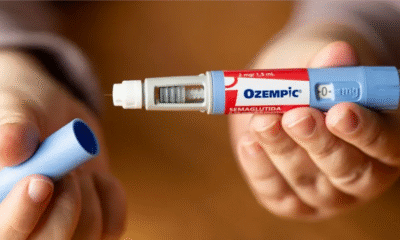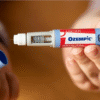Health
Dangerous Kratom Byproduct 7-OH Sold in Gas Stations Sparks Federal Crackdown — FDA Warns of Opioid-Like Risks
A new front in America’s opioid crisis is emerging — and it’s being sold at gas stations, vape shops, and smoke stores nationwide. Federal health officials are sounding alarms over 7-hydroxymitragynine (7-OH), a concentrated byproduct of kratom that’s turning up in everything from energy drinks to powders and capsules. The substance, which interacts with the brain’s opioid receptors, poses significant addiction and overdose risks, prompting a regulatory crackdown.
This week, the U.S. Department of Health and Human Services (HHS) and the Food and Drug Administration (FDA) announced plans to classify 7-OH as a controlled substance under the Controlled Substances Act (CSA). Described by FDA Commissioner Marty Makary as a “synthetic opioid that can be more potent than morphine,” 7-OH has triggered a sharp rise in drug-related medical emergencies across the country.
“After the last wave of the opioid epidemic, we cannot get caught flat-footed again,” Marty Makary warned, citing how vape shops are “popping up in every neighborhood,” peddling products laced with addictive compounds like 7-OH. Despite its presence in trendy “natural” wellness drinks, the FDA has not approved any 7-OH product for medical use, dietary supplements, or food additives.
What is 7-OH and Why is it So Dangerous?
Kratom, derived from the leaves of the Mitragyna speciosa tree native to Southeast Asia, has long been used for pain relief and as a mild stimulant. However, when kratom’s active ingredient — 7-hydroxymitragynine — is extracted and concentrated, its opioid-like effects intensify dramatically. Health experts warn that isolated 7-OH is capable of producing euphoria, dependence, and severe withdrawal symptoms akin to those seen with traditional opioids.
Despite being marketed as “all-natural,” many kratom-derived products contain inconsistent levels of 7-OH, with some formulations intentionally boosted for stronger effects. This has led to products masquerading as harmless tonics or supplements being sold without adequate regulation, putting consumers — especially youth — at risk.

Kratom Drinks
A Growing Concern Amid TikTok Virality and Community Outcry
A viral TikTok video, which showed a teenager attempting to steal a kratom-laced drink, reignited public debate about the unchecked sale of 7-OH products. Health officials, including HHS Secretary Robert F. Kennedy Jr., expressed outrage over how these products are marketed in “bright colors, candy flavors, and near schools.”
While kratom in its natural form remains legal in many states, the focus of the current crackdown is on 7-OH’s concentrated forms. The FDA’s proposed scheduling of 7-OH awaits review by the Drug Enforcement Administration (DEA), a process that could take several months.
For now, officials urge consumers to stay vigilant and avoid unregulated kratom-based products. “This is a sinister industry exploiting regulatory loopholes,” Robert F. Kennedy said.









































